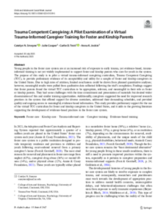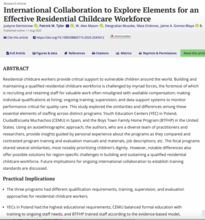Displaying 21 - 30 of 2509
In this TIME op-ed, anti-trafficking advocate Ruchira Gupta warns that the Trump administration’s recent immigration enforcement framework is endangering already vulnerable children.
This article explores how New York lawmakers have approved a bill that would bring greater transparency to “hidden foster care,” a practice where child welfare agencies pressure parents to place their children with relatives or others outside the formal foster care system, often without court oversight or access to legal protections.
This article explains how the Trump administration has renewed its attempt to terminate the Flores Settlement Agreement, a foundational policy dating back to the 1990s that mandates humane treatment and limits detention duration (to 72 hours) of migrant children held by U.S. Customs and Border Protection (CBP).
This news article explores how U.S. first Lady Melania Trump penned a personal letter to Russian President Vladimir Putin addressing the abduction of Ukrainian children amid the war, which President Trump then hand-delivered during their summit in Anchorage, Alaska.
This study piloted a virtual trauma-informed caregiving curriculum, Trauma Competent Caregiving (TCC), to assess its acceptability and usefulness for foster and kinship caregivers in the United States. Despite high attrition, qualitative findings indicate that caregivers found the curriculum relevant and meaningful, though they noted challenges with time demands and called for broader access to similar evidence-based training.
This study compares residential childcare workforce practices across programs in Poland, Spain, and the United States, examining recruitment, training, supervision, and performance monitoring. Findings reveal both shared priorities, such as upholding children’s dignity, and region-specific differences that suggest potential solutions and highlight the value of international collaboration to strengthen training standards.
Integrated healthcare models combining behavioral and primary care provide solutions for vulnerable pediatric populations, especially youth in foster care, facing disproportionately high rates of chronic conditions and mental health issues. This review synthesizes current literature to assess the impact of integrated care on health outcomes for youth in foster care in the U.S..
International adoptions to the United States have fallen to a record low, marking a 94 percent decline since their peak in the early 2000s.
A child developed a rash after he was prevented from changing his underwear for four days. A little boy, bored and overcome with despair, began hitting himself in the head.
This meta-analysis examines the impact of supportive housing on child welfare outcomes, focusing on whether it reduces foster care placements, facilitates family reunification, and decreases homelessness and subsequent child welfare reports in the United States.



